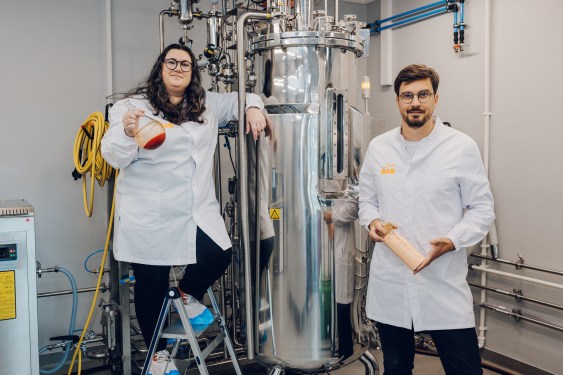Äio, pronounced EYE-oh, is the Estonian god of dreams. It is a fitting namesake for a rising startup from that small Baltic country called ÄIO. The company has developed a process to turn agricultural waste like sawdust into fats for the food and cosmetic industries. This process could help reduce the world’s dependency on palm oil. Palm oil is a staple for food and cosmetics due to its emulsifying and preservative properties. However, because the palm plant requires hot and humid climates, its massive industry has notoriously destroyed rainforests and other sensitive ecosystems to create farms.
ÄIO was co-founded by biotechnology scientists Nemailla Bonturi and Petri-Jaan Lahtvee. The company is based on Bonturi’s doctoral research, during which she invented a new microbe, a strain of yeast. Unlike yeast used for bread and beer that consumes sugar and outputs carbon dioxide gas or alcohol, this yeast consumes sugar and outputs fat molecules. The company will showcase its technology as part of Startup Battlefield at this year’s TechCrunch Disrupt event, which runs later this month in San Francisco.
Lahtvee was a professor of Food Technology and Bioengineering at Estonia’s Tallinn University of Technology. In 2016, he was running his own biotech lab there and hired Bonturi as his first employee. She brought her microbe with her, and they worked on the molecule, altering it to be hardy enough for manufacturing. Estonia has a large agricultural base of corn, other food grains, sugarcane, and lumber. The lab studied how sugars produced from those agricultural waste streams could feed this microbe. Lahtvee explained that they started developing metabolic engineering tools and found the microbe could consume those sugars quite well.
The molecule’s fat profile is very similar to existing fats. In its solid-fat form, it most closely resembles chicken fat. It is also possible to modify the fermentation process to produce a liquid oil that could serve as a good alternative to manufactured oils like canola or rapeseed oil. In 2022, the founders knew they had a commercially viable solution and launched ÄIO. They hoped to raise venture money and establish commercial partnerships to bring it to market. They have raised about seven million dollars so far. Since founding, they have created methods for developing precision fermentation products, won the 2024 Baltic Sustainability Award, and signed with over one hundred companies worldwide interested in collaboration.
The company states that their product undergoes extensive analysis. They have seen that their final product is to the same level of purity as vegetable oils, except for the pesticides, and is even more pure in some aspects. Next, the company plans to build a facility to produce the fat in commercial quantities by 2027. They also plan to license the technology to other cosmetic and food manufacturers. The company must obtain licenses to sell the fats as food on a country-by-country basis. They will most likely start with Singapore, which has a history of being more open to alternative food production products.
Bonturi said that producing food in this novel way requires going through all the necessary permits and analysis. As these plans progress, she expressed her hope to show how two scientists from a small country could actually do something better for the world, calling that her personal dream.

